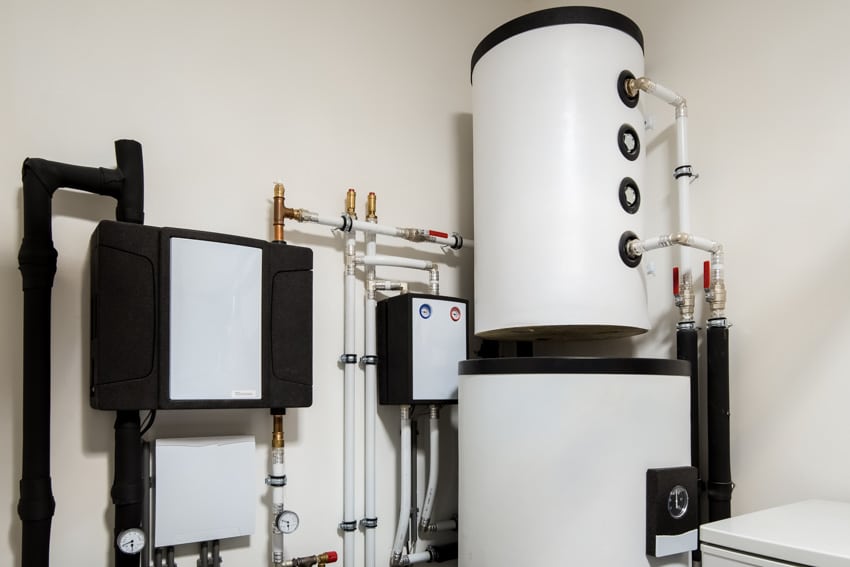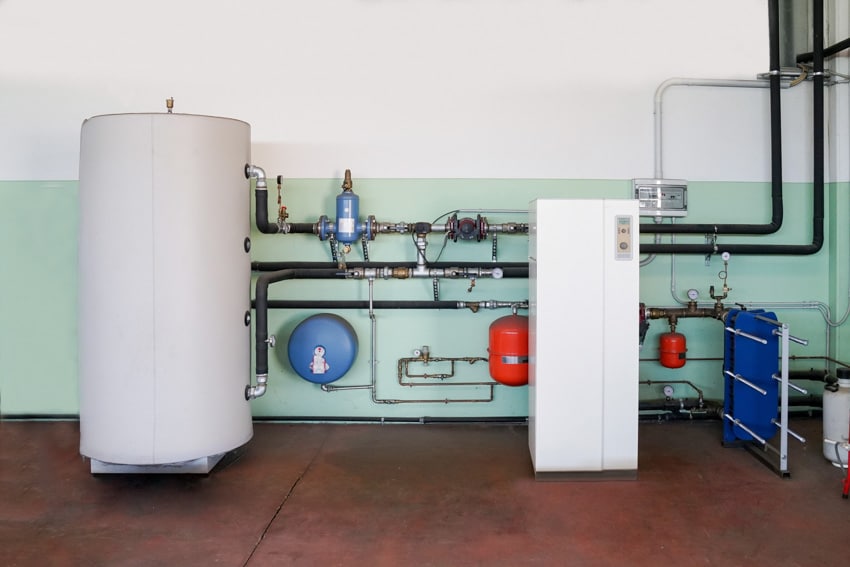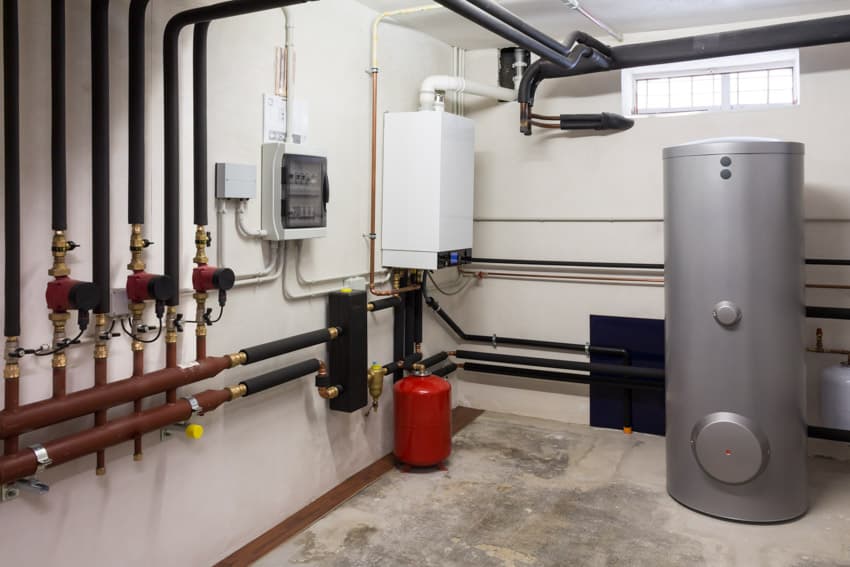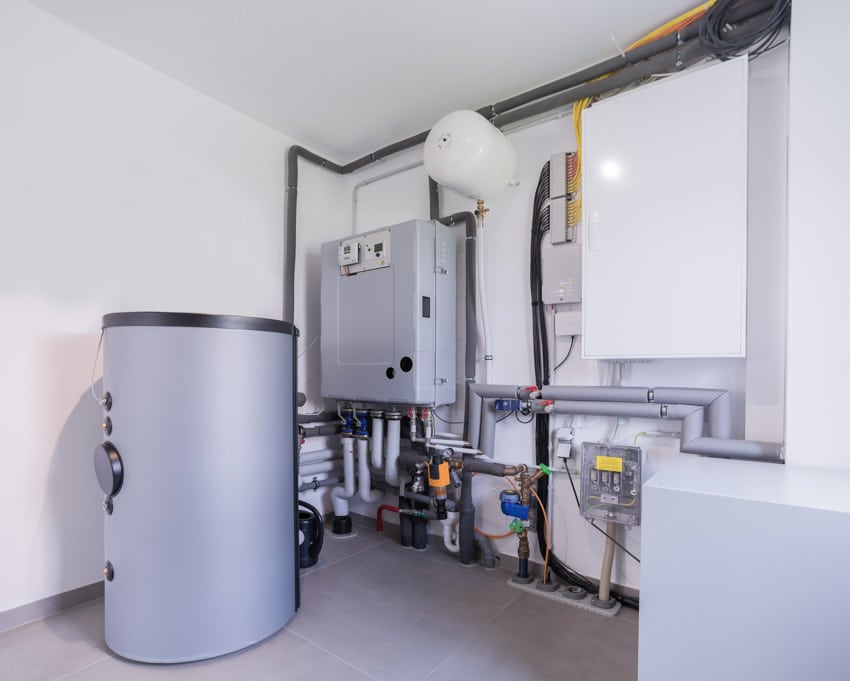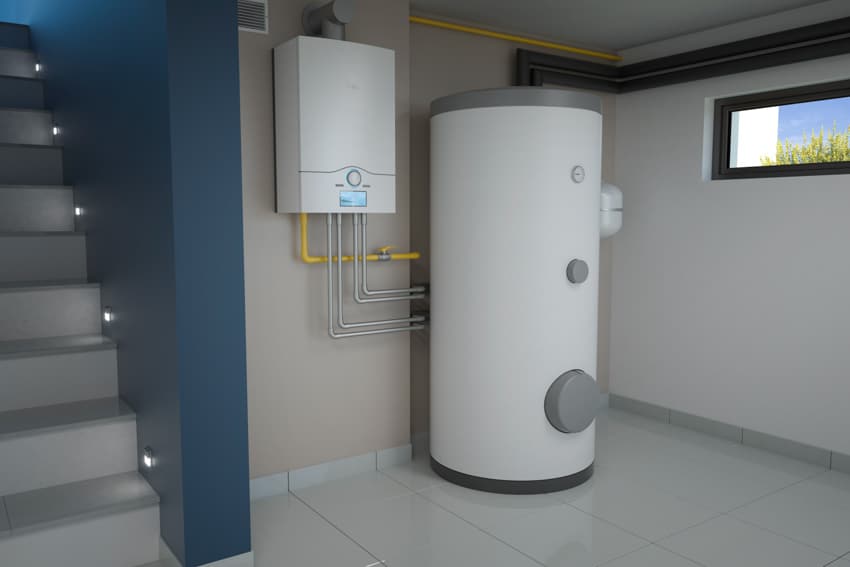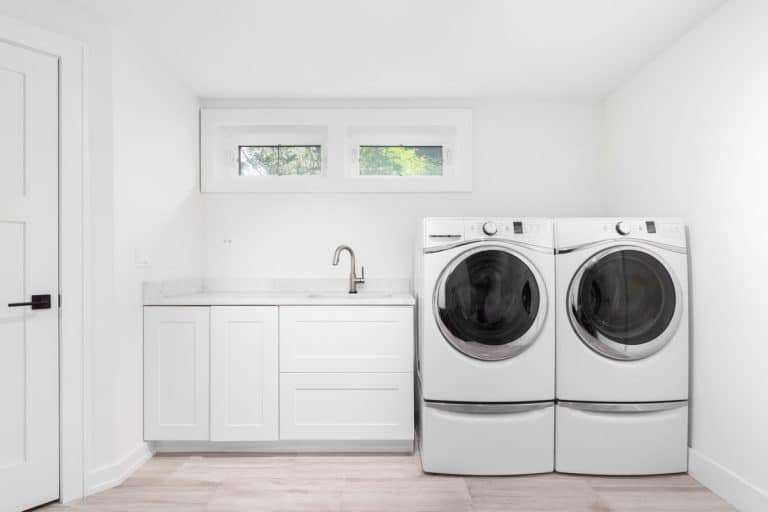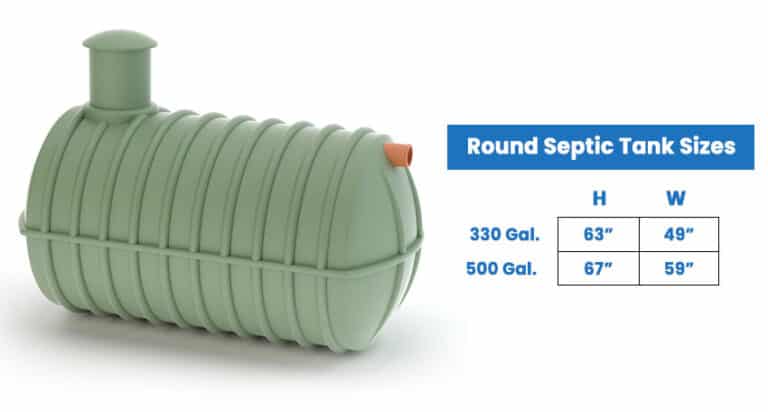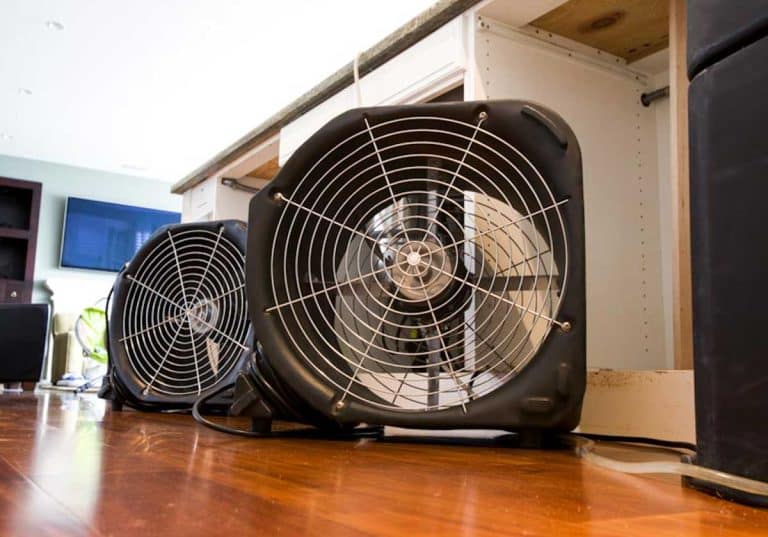Hybrid Water Heater Pros And Cons
In this hybrid water heater pros and cons guide, you’ll see what it is, how it works, the benefits, and if it’s worth it for your home’s heating needs.
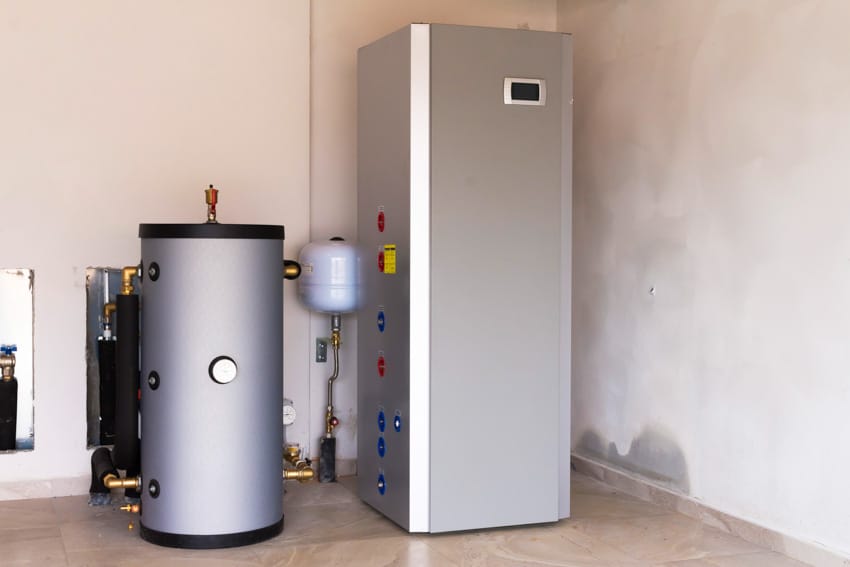
If you are interested in acquiring a new water heater, you have many choices. And as you browse for products, you might come across hybrid water heaters.
The term “hybrid” in water heaters may lead you to a certain understanding that they can operate on both fuel and battery sources, for instance. That, however, is not the case here.
Many plumbers and homeowners recognize a hybrid water heater as a significant advancement in energy-efficient technology. These systems can lead to considerable energy savings, offering environmental benefits and reducing long-term household expenses.
Even with all of the hybrid water heater pros and cons, this fixture is projected to save every household hundreds or even thousands of dollars in energy bills per year. [toc]
What Is A Hybrid Water Heater?
The features of a conventional water heater are combined with the advantages of an energy-efficient heat pump in a hybrid system, commonly referred to as a heat pump water heater. A hybrid system may be the best option if you reside in a warm region and all your home’s appliances are electric-powered.
A hybrid water heater, which has a storage tank in which water can be collected but is not constantly running, combines tankless and tank heating systems. These heaters heat the water by leveraging heat absorbed from the surrounding atmosphere.
Rather than producing heat directly, hybriddevices use electricity to transfer heat from one location to another. As a result, they can be up to three times more energy-efficient than standard electric tank heaters.
When transporting heat, heat pumps function like an inverted refrigerator. They pull air from the atmosphere they are in, heat it, and then throw it into the tank to raise the temperature of the water.
Furthermore, although a hybrid product is an excellent choice for most houses, take note that heat pump systems need more room than tankless water heaters as they usually have tanks and are henceforth not suitable for small-sized locations.
To function optimally, hybrid heating units need a warm or at least moderate climate. They will not operate effectively in cold climates since they pull heat from the exterior air.
Additionally, because of the labor required to modify the connectors, a home piped for a gas-powered water heater or other gas appliances might not be the greatest contender for hybrid system installation. A specialized high-voltage circuit and breaker might also be required.
How Does A Hybrid Hot Water System Work?
A hybrid water heater generates heat by drawing warm air from the outside atmosphere into the evaporator coil within the appliance. The evaporator coil is filled with refrigerant, which allows it to collect heat from the surrounding air.
Ultimately, a heat exchanger warms the water inside the tank to a suitable temperature before it is routed from the heating chamber to your home’s bathrooms, nozzles, showers, and major appliances.
To understand the hybrid water heater’s pros and cons better, you can imagine your heating unit as your refrigerator’s operation done backward. A heat pump water heater draws hot air in to heat the liquid rather than forcibly removing hot air to cool the components of a fridge or freezer.
A heat pump water device, like that of a tankless model, does not operate continuously, rendering it more efficient than a normal tank heater. Nevertheless, during times of excessive use, the tank will fill, preventing large households from having to run out of water at critical times.
Nonetheless, due to the “hybrid” part of their label, these systems are still fantastic improvements to your home even when the neighboring atmosphere is cold.
They are called “hybrid” as they also have traditional electric heating components that can turn on whenever there is a lot of activity or if more heat is necessary than what is available from the surrounding atmosphere.
Hybrid Heater Pros
Ultimate Efficiency and Long-Life Expectancy: Among all appliances, a hybrid heat pump water heater is arguably the most effective. Most household appliances find it difficult to attain 100% efficiency, which means they produce as much energy as they consume.
The typical efficiency rating of hybrid heat pump water heaters is 300%. As a result, they are less expensive to operate. Furthermore, hybrid types of water heaters not only cost very little to function than other systems but also last much longer.
Although traditional electric hot water tanks normally have a life expectancy of 8 to 12 years, hybrid heat pump water heaters normally have an amazing lifespan of 13 to 18 years.
Incredibly Eco-Friendly: Hybrid heaters, unlike gas heaters, fire no fossil fuels and generate zero harmful gasses. Hence, it does not require exterior venting. Furthermore, it is far more eco-friendly than traditional electric heating systems.
In addition, hybrid heat pump water heaters help to reduce the carbon footprint of your home. These units use energy-efficient blowers that are considerably more sustainable than gas-fired heaters.
Versatile Heating System: Traditional tank systems generate heat, which transfers the heat into the neighboring space. This can be detrimental to the performance of your home’s air conditioning system during the summer.
This is where hybrid systems stand out. They not only do not get hot during the summertime, but they also cool the air around them. They are logically equivalent to a water heater as well as an air conditioner combined.
Provides Substantial Water Storage: Unlike a tankless water heater, a hybrid type features a water tank where extra liquid storage can be kept. Thus, in most cases, you will not run out of water that easily.
Additionally, heat pump systems include electric heating components for days whenever you require additional hot water than usual. These systems can operate in auxiliary heat status but will resume standard operation when the demand is reduced.
Your House Might Become a Potential Candidate for a Tax Break: Once you buy and set up a hybrid appliance, you might be eligible for a tax break or a government-enabled rebate, depending on where you reside. It is sometimes the government’s means of rewarding you for helping to protect the environment.
Countless utility industries and public authorities provide mail-in rebates, reduced electricity rates, and tax benefits to homeowners implementing this new technology. As such, take some time to look into the options that are open to you.
Hybrid Heating Cons
Installation Can Be Very Costly and Complex: Installation charges can be prohibitively expensive for several homeowners. Normally, the installation of a hybrid water heater costs roughly 25% more than a conventional electric water heater installation.
The average installation task costs slightly more than $3,000, depending on the manufacturer, design, size, and category of system you choose. Aside from that, the installation of hybrid water tanks usually requires at least 1,000 cubic feet of space. Installing a designated water heater closet is not always the ideal solution in more compact homes and environments.
Furthermore, they produce some noise, especially if improperly installed. Hence, they must not be placed in noise-sensitive regions. It generally produces the same level of noise as a window air conditioner.
Can Only Operate the Most Efficiently in Warm Climates: Hybrid devices draw warm air from outside. Because of this, they might not be able to function well in a very cold climate.
Runs On Electricity: If your home is merely enabled for gas types of appliances, installing a hybrid unit can be a difficult and time-consuming task. You may need to modify the connectors and install a high-voltage breaker or circuit. Nonetheless, if you are converting a gas heating system to a hybrid one, the conversion might cost you approximately $150 to $300.
Is A Hybrid Heating Appliance Worth It?
Generally speaking, after assessing all the hybridwater heater pros and cons, yes. Considering the advantages that are previously stated, it is, without a doubt, worth it to purchase one of these systems and get it installed in your beloved home.
Hybrid water heaters are an attractive solution for all-electric homes with sufficient space for the structure and in areas where temperatures do not fall below 40°F. The excellent thing is that hybrid heating technologies are rapidly evolving. Specialized units also designed for colder climates are already available on the market.
Unfortunately, the upfront cost of a unit can be incredibly expensive, as previously mentioned. However, as formerly said, the majority of governments, as well as energy providers, are willing to offer rebates to minimize the initial cost of the device installation.
Furthermore, you will save approximately $4,000 throughout the life of your hybrid water heater. That would be about $350 per year! Take into account that these heaters have a longer life expectancy than more conventional options.
Indeed, the savings will be noteworthy for larger homes as well. You will then be able to lower your heater’s environmental impact. It will be up to four times less expensive than a traditional tank.
See more related content in our article about water heater dimensions on this page.

